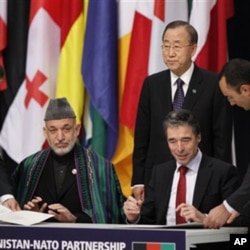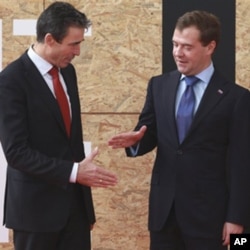NATO is remaking itself to meet the needs of the future. Yet for 2011, that means continuing the war in Afghanistan. Here's a look at the past year and what lies ahead for the world's oldest military alliance.
Strategy
NATO unveiled its new strategic concept in 2010, outlining the need to adapt to new challenges such as cyber-security and missile defense.
Perhaps NATO's biggest achievement of the year was resetting its relationship with Russia. At the NATO summit in Lisbon in November, Secretary-General Anders Foch Rasmussen outlined how NATO and Russia will work together in Afghanistan.
"Russia will allow more NATO supplies through Russian territory to support our mission in Afghanistan and now we will be able to bring equipment out as well," Rasmussen said. "We will enhance our training of counter-narcotics personnel, from Afghanistan and from the region."
Afghanistan remains a pressing priority for NATO. The alliance has thousands of troops there and has invested years in trying to save the country. Michael Clarke is the director of the Royal United Services Institute, a London security research organization.
"From now until 2014-2015, it is still the main game, and NATO somehow has got to be seen to have been effective in helping to implement Western policy so that whatever happens in Afghanistan is judged a basic success," Clarke said.
Expansion
Differences over NATO expansion and missile defense had hampered NATO's relationship with Russia. Expansion is on hold for now, and in Lisbon, NATO invited Russia to join in building a missile defense shield. Rasmussen was optimistic.
"For the first time in history, NATO nations and Russia will be cooperating to defend themselves, Russia will know without a doubt that the system cannot be directed against her," Rasmussen added. "Our citizens in Europe will share enhanced security that is unprecedented."
But in his annual address to his nation in December, Russian President Medvedev warned there could be a new arms race if Russia did not feel it is an equal partner with Europe and the United States in missile defense.
Security
NATO's traditional military role is only part of its focus. Cyber-security is another concern. Again Michael Clarke of the Royal United Services Institute.
"The things that NATO has to cope with even in its own neighborhood are more variable than they ever were in the past, and so NATO has got to be much more agile, and frankly it's got to better at deciding where to put the weight of its forces and effort," Clarke added.
In December, NATO's biggest member, the United States, took stock in Afghanistan.
"In many places the gains we have made are still fragile and reversible, but there is no question we are clearing more areas from Taliban control and more Afghans are reclaiming their communities," Mr. Obama.
As the year draws to a close, the fragility of those gains is evident in Afghanistan, where forces continue to battle militants. Training Afghan forces to take care of their own country is at the heart of NATO's strategy to leave Afghanistan.
















